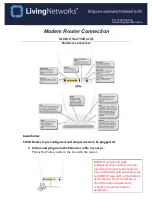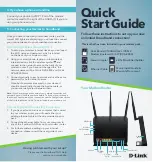
138
Frame Sync Cards
Physical Connection
Physical Connection
The frame sync input card, like all input cards, resides in an input bay of an NV8144, NV8280,
NV8576, or NV8576-Plus frame, with its matching backplane module. There is no frame sync
card available for an NV8140.
The frame sync card has an Ethernet port at its backplane. It is through an Ethernet connection
on this port that you can configure the card’s frame sync functions using iControl-Solo. It is also
through this port that you can use the card’s browser application.
When you place a frame sync card, with its backplane module, in a slot in a router frame, the
card initially acquires a default IP address that is based on the slot number: the lower octet of
the IP address is the slot number (in the range 1 to 64). The default subnet is 192.168.3.xxx.
The two frames of an expanded NV8576-Plus have identical slot numbering. Therefore, using
the defaults for IP address will probably result in duplicate IP addresses on the network you
use to configure the cards. You must assign specific IP addresses to such cards.
You can change the IP address of a frame sync card in the ‘Ethernet Settings’ page of MRC:
The IP address of the card is the IP address associated with the RJ-45 configuration port of the
card.
To assign the IP address, locate any devices of type ‘Hybrid Input Frame Sync’ and change their
IP addresses as required. Also change the gateway IP address if necessary. The subnet mask
should probably remain 255.255.255.0, but you can also change that if necessary.
After you change the IP address of frame sync card, it will never be assigned the default address
again. The IP address assigned to the frame sync card is actually stored in the card’s backplane
module. If you move the backplane module, the assigned IP address moves with it. The frame
sync cards themselves are interchangeable.
It is easy to forget the IP address of a frame sync card. There is no simple way to determine
the IP address of a particular frame sync card, particularly if your router has many of them.
If you do forget, open MRC’s ‘Ethernet Settings’ page and review the IP addresses of your
frame sync cards. Also open MRC’s ‘Module Status’ or ‘Module Types’ page. Each of these
pages tells you in which slots your frame sync cards are located, but does not tell you their IP
address. The ‘Ethernet Settings’ page tells you the IP address but does not tell you in which
slot the card (or really its backplane module) is located.
Summary of Contents for NV8500 Series
Page 1: ...NV8500 Series Hybrid Digital Video Audio Routers User s Guide UG0034 09 30 Oct 2014 ...
Page 8: ...viii ...
Page 16: ...xvi Table of Contents ...
Page 124: ...108 Expanded NV8576 Plus Connecting the NV8576 Plus Frames ...
Page 134: ...118 Alarms Making Alarm Connections ...
Page 150: ...134 Power Connecting to Power ...
Page 161: ...145 NV8500 Series User s Guide Network Page Time Page ...
Page 204: ...188 M3 Cards M3 Cable and Connectors ...
Page 216: ...200 Maintenance Obtaining Service ...
Page 228: ...212 IP Gateway Specifications ...
Page 236: ...220 Frame Expansion ...
Page 246: ......
















































